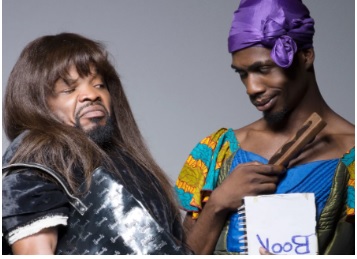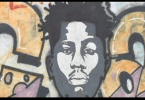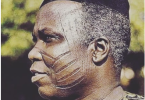Perhaps you are familiar with William Shakespeare’s books depicting court clowns – who entertained the royal families of medieval Europe. If so, then you already have an idea of where comedy originated from. Comedy in Nigeria could similarly be traced to witty village spokesmen or MCs (or Masters of Ceremony) in native Nigerian communities.
Village MCs – The Precursor of Comedy in Nigeria
Village MCs entertained guests, royals, chiefs, respected community leaders and onlookers at ceremonial occasions and festivals in times gone by. The village MC would often be charged with directing the order of events as well. This meant they have innumerable opportunities to inject humor into every passing detail of the event. In fact, without them, attendees of such events could be doomed to a dull experience – which they would rather avoid.
Their humor and acting skills would oftentimes be rewarded with cash and other gifts by excited spectators. An MC could even prompt stylishly for cash or gifts to further induce him/her to perform, and would usually succeed. Naturally, such skilled spokesmen (and women) began to earn a substantial living from their witty acts and words. That tradition of inviting witty MCs to private and public Nigerian ceremonies to spice up the event, is still hugely popular today. Hosts of a wedding, traditional ceremony, birthday, or bigger occasions in Nigeria would willingly pay an MC to cheer up their guests. Clearly without such expert entertainers, food, drink and music may often feel less satisfying and interactive.
The Progression of Comedy Into Nigerian Broadcasting & Film Industries
With time, witty and funny personalities began to take their place in popular mass media. Gifted comedians found their way into Nigeria’s broadcasting and film industries, and continue to do so. There was the case of Mazi Mperempe, an extraordinary Igbo broadcaster and entertainer. He worked with both Radio Nigeria and old Anambra State Television, Enugu between the 1970s and 1980s. He would begin his 30-minute program with a call-and-response slogan: ‘The time for action has arrived… nobody should run away!’ He proceeded to enliven his listeners (and viewers) with hilarious, unforgettable jokes and performances.
There were also broadcasters and actors within that same period stated above, who excelled in comedy. They included:
- The characters of ‘Chief Zebrudaya’, ‘Chief Jegede Shokoya’ and the rest of their crew (‘New Masquerade’ show),
- The comical traditional palace actors of ‘Village Headmaster’
- Late Moses Adejumo (the famous ‘Baba Sala’),
- Babatunde Omidina (‘Baba Suwe’) and his wife
- Sunday Omobolanle (‘Aluwe’)
Several on-air personalities and broadcasters would later emerge with their own style of humor and funny talk. And naturally, these comic broadcasters gravitated to paid acting, advertisement, MC and stand-up comedy roles as their popularity increased. The likes of late Gbenga Adeboye, Gbenga Adeyinka 1st, Nedu Wazobia, Lolo 1, Helen Paul, and Steve Onu (Yaw) are some of the most popular.
Also, the Nigerian film industry is now replete with scores of comic actors. The famous characters nicknamed Aki, Pawpaw, Mr. Ibu, Saka, late Pa Kasunmu and Sanyeri are famous examples. It would be great injustice not to mention the following immensely popular comic actors as well. Nkem Owoh, late Sam Loco Efe, Victor Osuagwu, Charles Inojie, Okey Bakassi and Frank Odega are also well-known.
The Advent of Stand-Up Comedy in Nigeria
In 1988, Alleluya Atunyota Akporobomeriere, (the famous ‘Ali Baba’) pioneered the insanely popular business of stand-up comedy in Nigeria. The graduate of Religious Studies/Philosophy of Ambrose Alli University, Ekpoma held the first comedy show at the pavilion of his school. The school was named Bendel State University at that time. And Ali Baba charged only N50 per guest. In later shows, Ali Baba’s earnings began to grow – to N150, N200, and N700. And along the line after graduation, he did menial jobs, then proceeded to be a newspaper columnist.
By the time Ali Baba relocated to Lagos in 1991, he had begun charging N1,000 for appearing at a show. He also featured on television shows such as Charly Boy Show, Night Train with Bisi Olatilo, and Friday Night Live on NTA station. Such appearances made him even more popular with viewers. Two years later, the comedian charged 50,000 Naira per show due to his rising profile. Fortune would shine on him in 1994, as Ali Baba signed an endorsement deal with Satzenbrau that earned him 1.5 million Naira. The comedian quickly proceeded to set up his entertainment company – Ali Baba Hiccupuray 3rd that same year.
Ali Baba dared the odds by erecting three large billboards around Victoria Island in 1988 – each costing 150,000 Naira per year. The message read, ‘Ali Baba – Being Funny is Serious Business’. As of today, Alleluya Akporobomeriere, aka Ali Baba charges no less than 5 million Naira per event. He remains the highest-paid comedian in Nigeria till date.
There were stand-up comedy actors namely John Chukwu, Tony St. Iyke, and Jude ‘Away Away who came before him, But none of them was able to promote and commercialize stand-up comedy to astronomical popularity as Ali Baba did. Ali Baba is reputed to have a net worth of more than 5 million US Dollars as we speak. He has also worked all the way into the roles of an actor, MC, photographer, businessman, and motivational speaker.
Ali Baba and other notable comedians that emerged after him have promoted and elevated stand-up comedy to the third most profitable entertainment sector in Nigeria, following the acting and music sectors. They have succeeded by promoting their own comedy shows, taking up acting roles, signing endorsements, and collaborating in joint comedy shows.
Opa WIlliams’ ‘Nite of a Thousand Laughs’ that debuted in 1995, was the first of such joint comedy shows. The show was inspired by the visit of both he and his production crew to a hospital, to console an actor on admission. It became a hilarious event. The erstwhile movie director encountered losses in his first three years thereabout of hosting the show, but remained focused. Williams at first sought for sponsors (which were not very forthcoming), and vowed to donate part of the proceeds to charity. He however used that medium to promote scores of up and coming comedians.
Williams thus transformed comedy into a viable ad enduring industry, grooming and polishing the comedians as they came. And now the comedy industry is raking in millions in revenue today. Aside from the ground-breaking work done by Ali Baba, Opa Williams became a huge catalyst. Williams could be said to be the actual progenitor of the now-lucrative comedy industry in Nigeria.
Some of these comedians were mentored by Ali Baba as well – particularly Ayo Makun (aka AY). AY is now immensely popular, an A-list personality in Nigerian comedy and acting industries of the modern day. AY charges at least 2 million Naira per event, if not more. The comedian also rakes in no less than 180 million Naira from his yearly comedy show ‘AY Live’. He also made over 135 million Naira from his comedy film ‘30 Days in Atlanta’, and produced other successful Nollywood projects.
The list of emerging and successful stand-up comedians in Nigeria continues to grow. They include A-list comedians such as Basketmouth, Bovi, I go Dye, Akpororo, Gordons, Okey Bakassi, and Julius Agwu.
Social Media Skits: The New Wave of Comedy in Nigeria
In recent times, a new wave of comic actors have emerged on the Nigerian social media scene. They used Instagram as their primary medium for creating short video comedy skits. Some of them also employ YouTube, TikTok, Facebook, Snapchat and Twitter.
They have thus become as successful as their precursors in the standup comedy business, as they gained more and more followership and patronage. This new category of Instagram comedians evolved into influencers and brand ambassadors as they became more popular, now signing juicy endorsement deals. Many of them are already counting their millions.
Notable social media comedians in Nigeria today include the following. And they are by no means exhaustive:
- Mr. Sabinus
- Taaooma
- Broda Shaggy
- Brain Jotter
- The Cute Abiola
- Jush2Funny
- Mr. Macaroni
- Mark Angel & Emmanuella
- Sydney Talker
- Nasty Blaq
- Craze Clown
- Lasisi Elenu
- Zic Saloma
- Charles Okocha
- Nedu Wazobia
- Maraji
- Warri Pikin
- Helen Paul
- Woli Agba
- Caramel Plug
- MC Lively
We can conclude from the brief history of many of these Instagram comedians, that the comedy industry became a saving grace. Comedy emerged as an escape route from the high unemployment statistics and unfavourable economic outlook of the nation. Hard labour and academic knowledge often failed to fetch Nigerian youths a decent living (or even any job at all). But the entertainment industry, the comedy sector not in the least, has brought out their creativity and delivered them.







